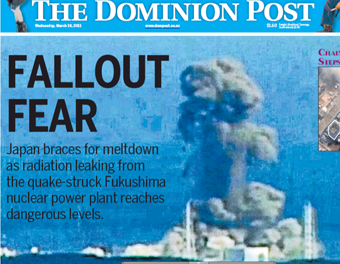
Karina Abadia
AUCKLAND: A wiki set up by a Yokohama resident to document poor reporting of Japan’s earthquake, tsunami and nuclear crisis has already attracted more than 200 examples of sensationalist and inaccurate journalism.
Andrew Woolner set up the wiki JPquake – Journalist Wall of Shame in response to the media’s portrayal of the situation and to enable similarly frustrated people to pool resources and highlight factual errors in journalism.
His blog entry of March 17, Why bad journalism has driven me to desperate ends, explains that he was fed up with the “shoddy, alarmist and shockingly wrong” journalism being conducted.
Woolner, a Canadian theatre director who has called Japan home since 2003, decided to set up his wiki six days after the earthquake and tsunami but never expected it to take off in the way it has.
Human story 'ignored'
Woolner stresses that his main motivation is not to carry out a "witch hunt” but to underline that the “human story is being ignored” and to encourage people to donate to the Japanese victims of the disasters.
“There really is a story up north – people aren’t getting supplies and journalists could do so much more to help by keeping the focus on that.”
And that story rather than the “side show” that is Fukushima, Woolner said.
Despite his only marketing being word-of-mouth and updates on Twitter, the number of posts on the wiki have increased rapidly and the site now includes more than 200 entries from a multitude of publications written in several different languages.
Among the unmoderated posts New Zealand’s TVNZ and TV3 are scrutinised for their handling of the disasters.
Also featured is Wellington’s Dominion Post. A submitter claimed the March 16 front cover used a picture of a mushroom cloud rather than of Reactor 3.
The post however, was retracted after it was proven to be correctly captioned. The Dominion Post March 16 story can be read here.
Contributors to the site are asked to document articles and rank them in terms of the “severity of offence” on a scale from one to 11, ranging from 1-2 “probably unintentional and based on bad info that seemed legit” to the very succinct 11: “Satan.”
Woolner thinks more context should be given to inform the public of updates on the situation in Japan. In regard to the levels of radiation detected in water supplies, for instance, where these levels are being detected and what the levels are once the water reaches people’s houses should be reported.
It is a point reiterated by English teacher and site contributor Avery Morrow who lives in Kyushu, Japan, and has agreed to help Woolner with the site.
Reports lacking context
“The facts, when they are reported, are accurate, but there’s not enough context. Japan is checking radiation levels. Their safety standards are very high,” he said.
“The Japanese media is covering all of the same issues as the foreign media. The difference is completely in tone . . . I think the concept of responsibility for public statements is extremely well-developed in Japan.”
The site also provides some positive feedback. The Some Good Journalism wiki page gives praise to, as Woolner says in his blog, “pieces that really shine” and there is also a Heroes of the Quake page to which people can contribute.
Woolner is acutely aware of the importance of the moderating and editing process and makes clear in the wiki that most of the information is currently “raw and unmoderated”.
Once the “furore dies down” and articles have been checked, he hopes to narrow the focus to about the 50 most factually incorrect or damaging articles and encourage contributors to write to the relevant press councils with the findings.
He hopes the site will “raise awareness in the journalism community and among people who consume media seriously” and that as a result “it will end up making a difference”. - Te WahaNui/Pacific Media Watch
To donate to the Japanese disaster, please contact the New Zealand Red Cross or a similar charity.



